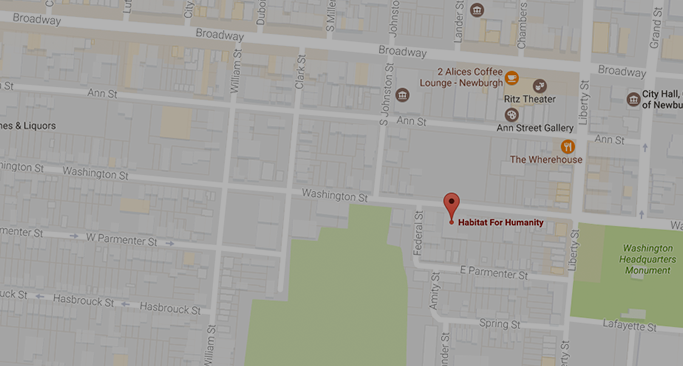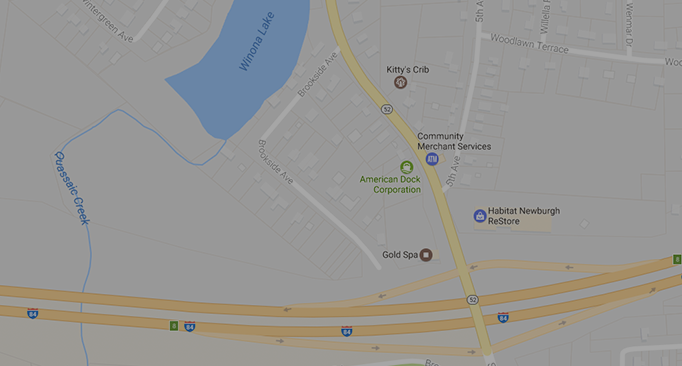- Does Habitat Newburgh give its houses away?
- How do you select the families with whom you partner?
- What is sweat equity?
- How can I get involved?
- Where does your funding come from?
- How do you determine the sales price of your homes?
- How do you acquire your properties?
- What is the ReStore?
- Is Habitat for Humanity a Christian organization?
- What is your organization's privacy policy?
-
Does Habitat Newburgh give its houses away?
No. The families with whom we partner pay an affordable mortgage for their home and contribute sweat equity hours to the building of homes in Newburgh.
-
How do you select the families with whom you partner?
Habitat families are working families living within our service area whose income falls between 30-60% of the area median income as established by the US Department of Housing and Urban Development (based on US census statistics). Every family completes an extensive application.
Families are selected based on 3 criteria:
~ Need for Shelter
~ Ability to Pay an Affordable Mortgage
~ Willingness to PartnerNEED FOR SHELTER
The need for adequate shelter is measured by the condition of the family’s current housing including the structural safety, integrity, and mechanical function of the home. Also considered is the size of the living quarters, whether the situation is temporary, the cost of housing, and the family’s income.ABILITY TO PAY AN AFFORDABLE MORTGAGE
We determine that a family has sufficient income if 30% of their income can go towards the mortgage and escrow payment. In determining the family's ability to pay we do a full financial profile including the family’s debt to income ratio; monthly payment consistency, credit score, and history of bankruptcy, liens, and judgments.WILLINGNESS TO PARTNER
The following factors are used to determine whether families are willing to partner with Habitat. Habitat will consider whether the family:Participated in pre-screening contact and readily engaged in a home visit
Attempted to attend Habitat functions
Provided necessary documentation and references
Expressed a desire to make this community their permanent home
Is comfortable with credit and reference evaluations
Recognizes the responsibility of homeownership
Realizes that Habitat needs active partners. -
What is sweat equity?
Sweat equity is the hands-on involvement of future homeowner families in the construction of Habitat homes. It is a very important in building the partnership between the families and Habitat staff and volunteers. Every family selected by Habitat must complete sweat equity hours.
The following are required by each family:
250 hours total per single adult family-each household member over the age of 16 years old must contribute to the total hours.500 hours per two “or more” adult family- each household member over the age of 16 years old must contribute to the total hours.
80 hours can be contributed by friends and family (anyone not currently residing in your home).
40 hours can be used for non-construction activities; i.e. attendance for required educational workshops, attendance of approved budgeting/finance classes, home repairs/construction classes through other organizations, work on a Habitat committee, fundraising event, speaking on behalf of Habitat at a scheduled speaking engagement or at the ReStore.
Sweat equity hours are tracked and all hours must be completed before purchasing the home.
-
We’re always on the lookout for individuals like you wanting to get involved. Visit our How To Help section to find out ways to donate or volunteer.
-
Habitat Newburgh relies on donations from individuals, corporations, foundations and the faith community. We receive limited government funding to defray the high cost of environmental remediation (primarily lead and asbestos abatement) and infrastructure. Mortgage payments are used to support our home building efforts as well as proceeds from the ReStore. We do not rely on any one source of revenue.
If you would like to make a donation please press the donate button.
-
How do you determine the sales price of your homes?
We use an appraisal to determine the fair market value of the house. This value is used as the sales price. If a homeowner's affordability rate (30% of household income) is less than the fair market value, we offer an affordability subsidy secured with a silent mortgage to discount the mortgage to this level. In the rare instance where the total development costs are lower than the both of these, that cost will determine the mortgage rate and the difference between it and the fair market value will be secured with a silent mortgage.
-
How do you acquire your properties?
Many of our properties are donated to us or we purchase them at a significantly discounted rate. All properties are considered before acceptance or purchase of them based on the location and ability to contribute to building neighborhoods, the cost of environmental remediation, the structural integrity, and the ability to conform to the Habitat model of building.
-
What is the ReStore?
The ReStore is a non-profit home improvement store and donation center that sells new and gently used furniture, home accessories, building materials and appliances to the public at a fraction of the retail price. Proceeds are used to support our partnership with families in building strength, stability and self-reliance through homeownership.
-
Is Habitat for Humanity a Christian organization?
Yes, we are a global nonprofit, ecumenical Christian housing organization. All who desire to be a part of this work are welcome, regardless of religious preference or background. We believe in building with people in need regardless of race or religion. We welcome homeowners, volunteers, and supporters from all backgrounds.
-
What is your organization's privacy policy?
Our organization takes our privacy policy seriously and takes steps to protect and ensure the safety of our supporters. We do not sell or otherwise disclose information about our volunteers or supporters outside of our immediate organization. This policy has no exceptions. We do not sell or exchange your information with any other organizations, public, private or nonprofit. For more detailed information visit our Privacy Policy page.



